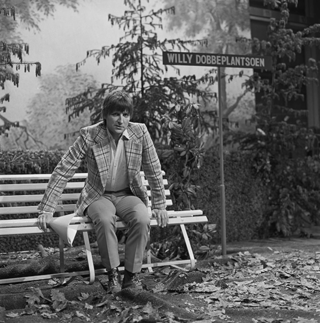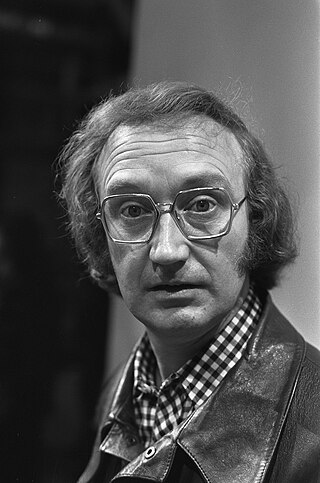
Ligne claire is a style of drawing created and pioneered by Hergé, the Belgian cartoonist and creator of The Adventures of Tintin. It uses clear strong lines sometimes of varied width and no hatching, while contrast is downplayed as well. Cast shadows are often illuminated, and the style often features strong colours and a combination of cartoonish characters against a realistic background. The name was coined by Joost Swarte in 1977.

Willem Theodoor "Wim T." Schippers is a Dutch artist, comedian, television director, and voice actor. During the 1960s, he worked mostly as a visual artist, associated with the international Fluxus-movement. As a television writer, director, and actor he is responsible for some of the most notable and controversial shows on Dutch televisions from the 1960s to the 1990s, creating a number of lasting characters and enriching the language with terms and expressions first coined in his shows. In addition, he voiced the characters of Ernie and Kermit the Frog on Sesamstraat, the Dutch version of Sesame Street. For his shows, he has written over three hundred songs, and his reputation has changed from being Dutch television's "enfant terrible" to an acknowledged master in a variety of genres.

Theo van den Boogaard – also known as Theo Bogart – is a Dutch cartoonist. He first came to attention as an underground cartoonist in the early 1970s for the sexually explicit comics series Ans en Hans krijgen de kans. He is best known for co-creating Sjef van Oekel, a long-running comic strip based on the TV character, written by Wim T. Schippers. He received the 1989 Stripschapprijs for his body of work.

TopPop was a Dutch television programme. It was the first regular dedicated pop music television series in the Dutch language area. The Netherlands broadcaster AVRO aired the programme weekly from 22 September 1970 to 27 June 1988. Presenter Ad Visser hosted for its first fifteen years. The creator and original director of TopPop was Rien van Wijk. Many other directors followed: Egbert van Hees, Geert Popma, Henk Renou, Chris Berger, Jessy Winkelman, Wim van der Linden, Bert van der Veer and Charly Noise. Although TopPop was inspired by British music programme Top of the Pops, it had its own character.
Opzoek naar Yolanda was a Dutch dramady television show by Wim T. Schippers, consisting of six episodes aired by the VPRO from October to December 1984. The show was a continuation of sorts of Schippers' De lachende scheerkwast (1981-1982) and featured some of the same characters. In turn, it was a kind of prequel to We zijn weer thuis, which ran from 1989 to 1994.

De lachende scheerkwast is a Dutch television show written and directed by Wim T. Schippers, who also plays one of the lead characters, Jacques Plafond. It ran on VPRO television for six episodes in 1981 before being canceled, and then returned for another six episodes.

Clous van Mechelen is a Dutch musician, arranger, and actor. Van Mechelen scored a minor hit in 1969 with his band The Butlers, and became widely known through the radio and television shows written and directed by Wim T. Schippers, in which he played the character Jan Vos and wrote songs for the various characters.
Ronflonflon, or Ronflonflon avec Jacques Plafond, was a radio show on the Dutch broadcaster VPRO. It was produced and directed by Wim T. Schippers who also played the principal character and radio host, Jacques Plafond. Between 10 October 1984 and 30 January 1991, 328 episodes were produced, and it became the VPRO's best-listened radio program.

Het is weer zo laat!, also known as Waldolala, is a Dutch television show from 1978, written and directed by Wim T. Schippers and co-produced by Schippers, Gied Jaspars, Wim van der Linden en Ellen Jens. It was the last TV show written for Dolf Brouwers, who had played the character Sjef van Oekel in previous shows.

Dolf Brouwers was a Dutch comedian, singer, and television actor who rose to fame late in life playing the character Sjef van Oekel in the 1970s satirical television shows aired on VPRO, written and directed by Wim T. Schippers, Ruud van Hemert, Gied Jaspars, and Wim van der Linden.

Sjef van Oekel was a TV comedy character created by Dutch artist Wim T. Schippers and played by Dutch comedian, singer and actor Dolf Brouwers (1912–1997). Van Oekel started as a side character in De Fred Hachéshow in 1972 but became such a cult figure that he gained his own television show, Van Oekel's Discohoek, songs and even a comic strip, all written by Schippers.

Ellen Jens was a Dutch television director and producer, best known for her collaboration with Wim T. Schippers on VPRO television. She produced and directed a large number of other television shows, especially on literature and art, and was referred to as a "television legend".

Barend is weer bezig was a Dutch television show written and directed by Wim T. Schippers with Wim van der Linden, Gied Jaspars, and Ruud van Hemert and broadcast by the VPRO in 1972-1973. The show was produced by Ellen Jens. Four regular episodes and a Christmas special were made. The series caused considerable controversy, particularly because of a scene in which the then-reigning Queen Juliana of the Netherlands was mocked.

IJf Blokker is a Dutch musician and television actor and presenter. After a professional career as a drummer, he became a well-known television actor in the 1970s playing the character Barend Servet in the Wim T. Schippers-directed shows on VPRO television.

De Fred Haché Show is a 1971 Dutch television show written and directed for the VPRO by Wim T. Schippers, Ruud van Hemert, Wim van der Linden, and Gied Jaspars. The show marked the return to television for Schippers, van der Linden, and Jaspars, who had been on the team that was responsible for the controversial 1967 show Hoepla, canceled after three episodes. Like its "sister show" Barend is weer bezig (1972–1973) and Van Oekel's Discohoek, it was an absurdist show with much nudity, linguistic humor, satirical skits, and illogical plot lines.

Wim van der Linden was a Dutch photographer and film and television director. As a photographer he documented slums and subcultures in Amsterdam in the 1960s. His "Tulips", one of four experimental and satirical Sad Movies (1966-1967), is praised as one of the dramatic high points of Dutch film history, and with Wim T. Schippers and others he made groundbreaking and controversial television shows for the VPRO in the 1960s to the 1970s.
Plafond over de vloer is a Dutch television show in nine episodes, aired in 1986 by the VPRO and written and directed by Wim T. Schippers. It derives from the radio show Ronflonflon, and its main character is that show's host, Jacques Plafond.
We zijn weer thuis is a Dutch dramady-series broadcast by VPRO from 1989 to 1994. It was written by Wim T. Schippers and co-directed with Ellen Jens as his swansong-series for VPRO. The series was released on dvd in October 2007; nostalgia-channel Best 24 first started reruns in 2010.
Celebrity comics are comics based on the fame and popularity of a celebrity. They are a byproduct of merchandising around a certain media star or franchise and have existed since the mass media and comics came into existence in the 19th century. Celebrity comics are usually not held in high esteem by critics, because of their purely commercial nature. They are solely created to capitalize on media trends and therefore published so quickly and cheaply that drawings and narratives tend to be of very low quality.













